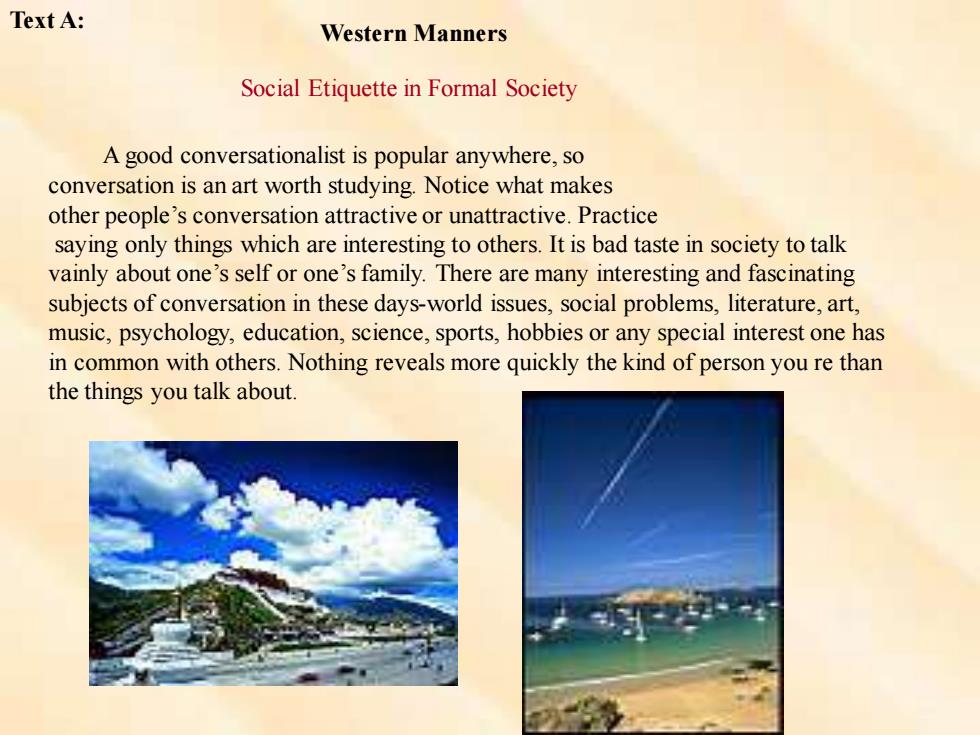
Text A: Western Manners Social Etiquette in Formal Society A good conversationalist is popular anywhere,so conversation is an art worth studying.Notice what makes other people's conversation attractive or unattractive.Practice saying only things which are interesting to others.It is bad taste in society to talk vainly about one's self or one's family.There are many interesting and fascinating subjects of conversation in these days-world issues,social problems,literature,art, music,psychology,education,science,sports,hobbies or any special interest one has in common with others.Nothing reveals more quickly the kind of person you re than the things you talk about
Text A: Western Manners Social Etiquette in Formal Society A good conversationalist is popular anywhere, so conversation is an art worth studying. Notice what makes other people’s conversation attractive or unattractive. Practice saying only things which are interesting to others. It is bad taste in society to talk vainly about one’s self or one’s family. There are many interesting and fascinating subjects of conversation in these days-world issues, social problems, literature, art, music, psychology, education, science, sports, hobbies or any special interest one has in common with others. Nothing reveals more quickly the kind of person you re than the things you talk about

Subjects to Avoid There are certain things which it is considered bad manners in Western countries to talk about in society.It is very important to know these and avoid them.The subjects to be avoided are:bodily functions,or anything connected with the more private parts of the body,details of birth,details of unpleasant illnesses; income or salary of friends,or prices of their possessions;the age of the person one is talking with;personal questions or remarks,such as,"Why don't you get married?"or"I should think you would want to have some children."Some of these are allowed in Chinese society,but they are all taboo in formal Western society
Subjects to Avoid There are certain things which it is considered bad manners in Western countries to talk about in society. It is very important to know these and avoid them. The subjects to be avoided are: bodily functions, or anything connected with the more private parts of the body, details of birth, details of unpleasant illnesses; income or salary of friends, or prices of their possessions; the age of the person one is talking with; personal questions or remarks, such as, “Why don’t you get married?” or “I should think you would want to have some children.” Some of these are allowed in Chinese society, but they are all taboo in formal Western society
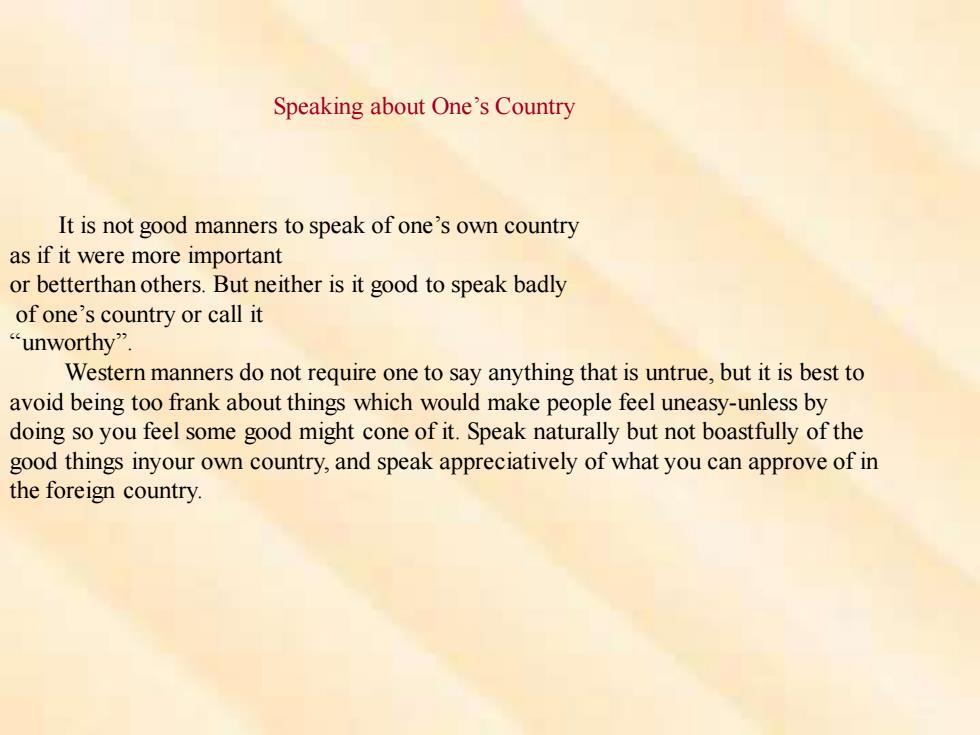
Speaking about One's Country It is not good manners to speak of one's own country as if it were more important or betterthan others.But neither is it good to speak badly of one's country or call it “unworthy”. Western manners do not require one to say anything that is untrue,but it is best to avoid being too frank about things which would make people feel uneasy-unless by doing so you feel some good might cone of it.Speak naturally but not boastfully of the good things inyour own country,and speak appreciatively of what you can approve of in the foreign country
Speaking about One’s Country It is not good manners to speak of one’s own country as if it were more important or betterthan others. But neither is it good to speak badly of one’s country or call it “unworthy”. Western manners do not require one to say anything that is untrue, but it is best to avoid being too frank about things which would make people feel uneasy-unless by doing so you feel some good might cone of it. Speak naturally but not boastfully of the good things inyour own country, and speak appreciatively of what you can approve of in the foreign country
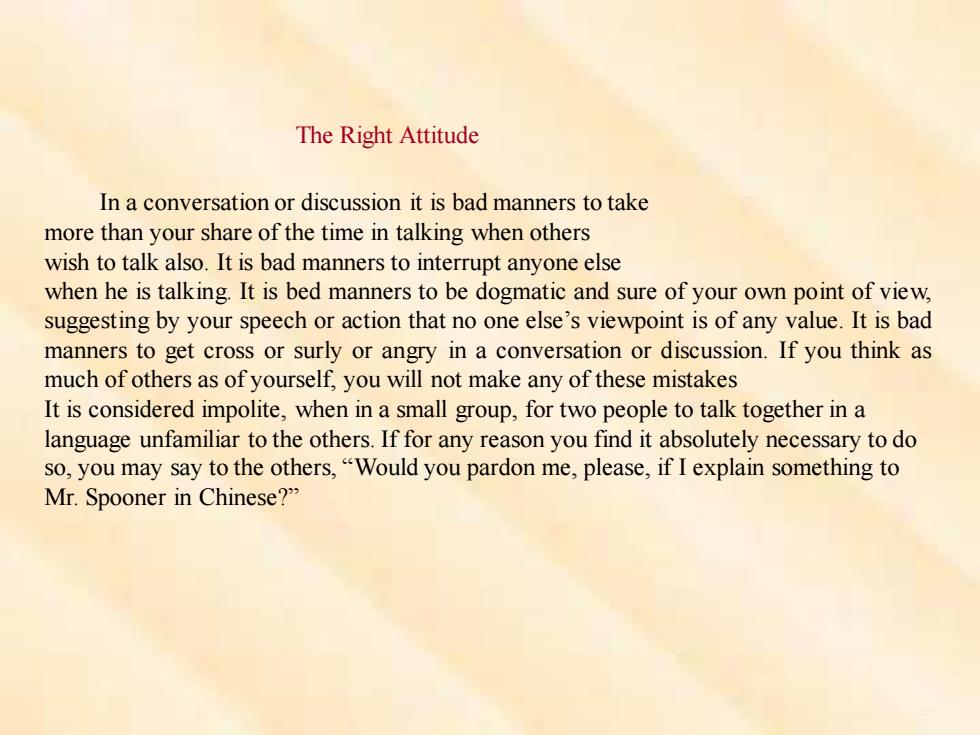
The Right Attitude In a conversation or discussion it is bad manners to take more than your share of the time in talking when others wish to talk also.It is bad manners to interrupt anyone else when he is talking.It is bed manners to be dogmatic and sure of your own point of view, suggesting by your speech or action that no one else's viewpoint is of any value.It is bad manners to get cross or surly or angry in a conversation or discussion.If you think as much of others as of yourself,you will not make any of these mistakes It is considered impolite,when in a small group,for two people to talk together in a language unfamiliar to the others.If for any reason you find it absolutely necessary to do so,you may say to the others,"Would you pardon me,please,if I explain something to Mr.Spooner in Chinese?
The Right Attitude In a conversation or discussion it is bad manners to take more than your share of the time in talking when others wish to talk also. It is bad manners to interrupt anyone else when he is talking. It is bed manners to be dogmatic and sure of your own point of view, suggesting by your speech or action that no one else’s viewpoint is of any value. It is bad manners to get cross or surly or angry in a conversation or discussion. If you think as much of others as of yourself, you will not make any of these mistakes It is considered impolite, when in a small group, for two people to talk together in a language unfamiliar to the others. If for any reason you find it absolutely necessary to do so, you may say to the others, “Would you pardon me, please, if I explain something to Mr. Spooner in Chinese?
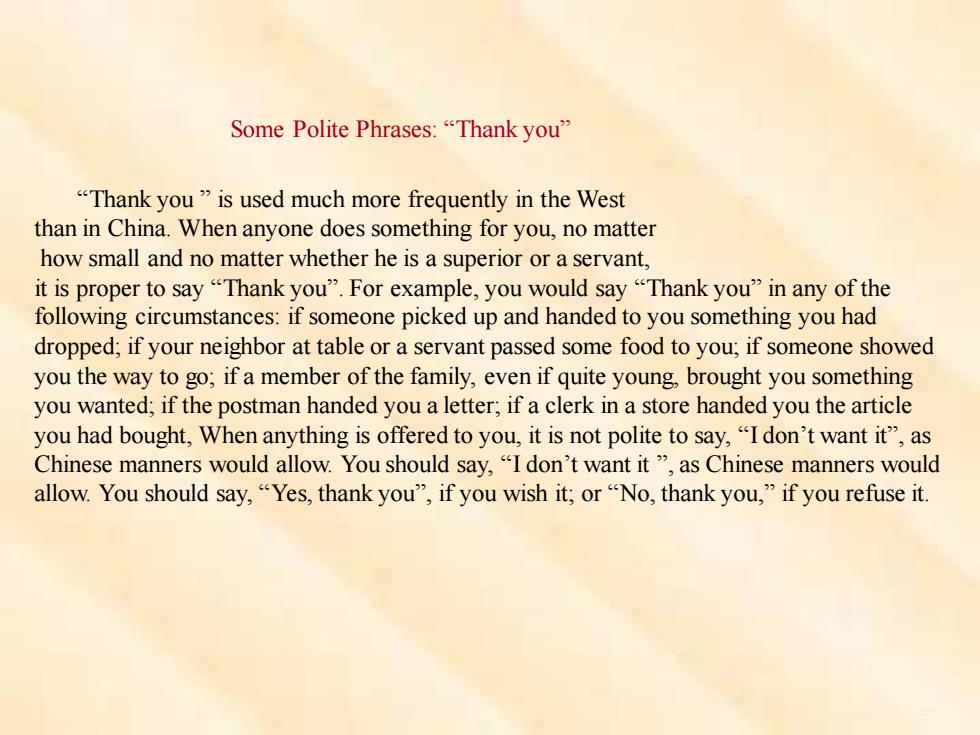
Some Polite Phrases:"Thank you" "Thank you"is used much more frequently in the West than in China.When anyone does something for you,no matter how small and no matter whether he is a superior or a servant, it is proper to say "Thank you".For example,you would say"Thank you"in any of the following circumstances:if someone picked up and handed to you something you had dropped;if your neighbor at table or a servant passed some food to you;if someone showed you the way to go;if a member of the family,even if quite young,brought you something you wanted;if the postman handed you a letter;if a clerk in a store handed you the article you had bought,When anything is offered to you,it is not polite to say,"I don't want it",as Chinese manners would allow.You should say,"I don't want it",as Chinese manners would allow.You should say,"Yes,thank you",if you wish it;or"No,thank you,"if you refuse it
Some Polite Phrases: “Thank you” “Thank you ” is used much more frequently in the West than in China. When anyone does something for you, no matter how small and no matter whether he is a superior or a servant, it is proper to say “Thank you”. For example, you would say “Thank you” in any of the following circumstances: if someone picked up and handed to you something you had dropped; if your neighbor at table or a servant passed some food to you; if someone showed you the way to go; if a member of the family, even if quite young, brought you something you wanted; if the postman handed you a letter; if a clerk in a store handed you the article you had bought, When anything is offered to you, it is not polite to say, “I don’t want it”, as Chinese manners would allow. You should say, “I don’t want it ”, as Chinese manners would allow. You should say, “Yes, thank you”, if you wish it; or “No, thank you,” if you refuse it
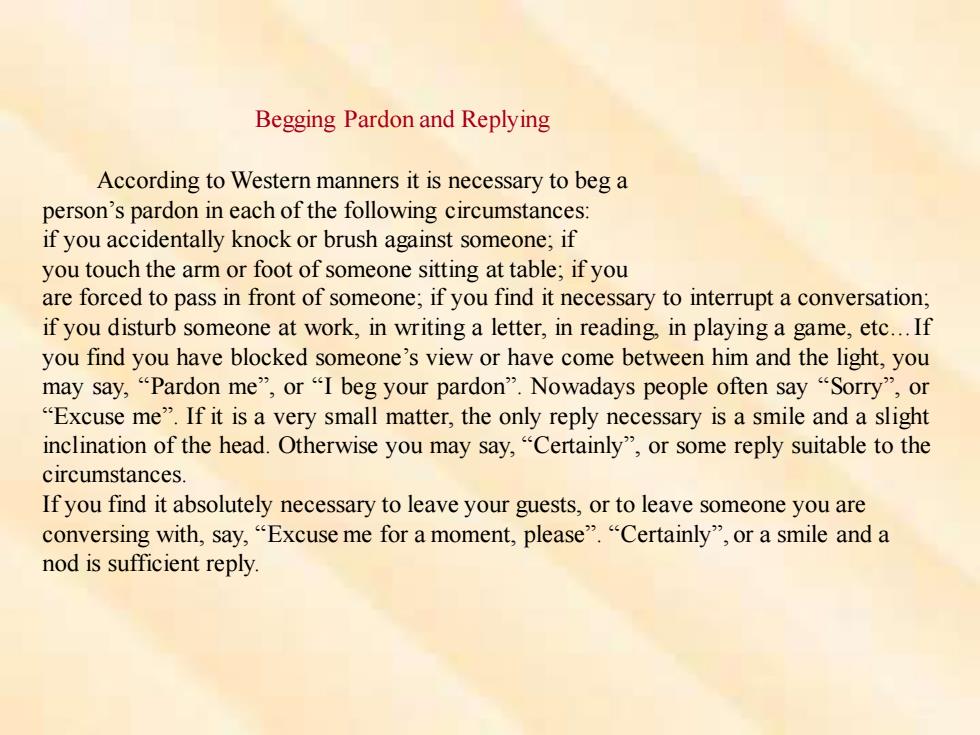
Begging Pardon and Replying According to Western manners it is necessary to beg a person's pardon in each of the following circumstances: if you accidentally knock or brush against someone;if you touch the arm or foot of someone sitting at table;if you are forced to pass in front of someone;if you find it necessary to interrupt a conversation; if you disturb someone at work,in writing a letter,in reading,in playing a game,etc...If you find you have blocked someone's view or have come between him and the light,you may say,,“Pardon me”,or“I beg your pardon'.Nowadays people often say“Sorry”,or "Excuse me".If it is a very small matter,the only reply necessary is a smile and a slight inclination of the head.Otherwise you may say,Certainly",or some reply suitable to the circumstances. If you find it absolutely necessary to leave your guests,or to leave someone you are conversing with,say,“Excuse me for a moment,please”.“Certainly”,or a smile and a nod is sufficient reply
Begging Pardon and Replying According to Western manners it is necessary to beg a person’s pardon in each of the following circumstances: if you accidentally knock or brush against someone; if you touch the arm or foot of someone sitting at table; if you are forced to pass in front of someone; if you find it necessary to interrupt a conversation; if you disturb someone at work, in writing a letter, in reading, in playing a game, etc…If you find you have blocked someone’s view or have come between him and the light, you may say, “Pardon me”, or “I beg your pardon”. Nowadays people often say “Sorry”, or “Excuse me”. If it is a very small matter, the only reply necessary is a smile and a slight inclination of the head. Otherwise you may say, “Certainly”, or some reply suitable to the circumstances. If you find it absolutely necessary to leave your guests, or to leave someone you are conversing with, say, “Excuse me for a moment, please”. “Certainly”, or a smile and a nod is sufficient reply

Text A: Western Manners Social Etiquette in Formal Society A good conversationalist is popular etiquette,n. 礼节,礼仪 anywhere,so conversation is an art worth woth,prep.值..钱,相当于..价值.值得做 studying.Notice what makes other people's The stamp is worth at least 10.000us dollars. 枚邮票至少值1万美元 conversation attractive or unattractive. An old house badly maintained would not be Practice saying only things which are worth spending money on..花钱买一所年久失 interesting to others.It is bad taste in 修的旧房不值得 society to talk vainly about one's self or It isn't worth waiting for him.不值得等候他 practice,v. one's family.There are many interesting ()练习,实习,训练 and fascinating subjects of conversation in I need to practice my English before my business these days-world issues,social problems, tp.出差前我要练习一下英语 (2)从事(职业) literature,art,music,psychology,education, He's practiced law for only a year. science,sports,hobbies or any special 他做律师只有一年 interest one has in common with others. (3)执行 Nothing reveals more quickly the kind of Practice a command.执,行命令 Practice doing sth: person you re than the things you talk about. Every morning I practice speaking English 每天早晨我练习说英语
Text A: Western Manners Social Etiquette in Formal Society A good conversationalist is popular anywhere, so conversation is an art worth studying. Notice what makes other people’s conversation attractive or unattractive. Practice saying only things which are interesting to others. It is bad taste in society to talk vainly about one’s self or one’s family. There are many interesting and fascinating subjects of conversation in these days-world issues, social problems, literature, art, music, psychology, education, science, sports, hobbies or any special interest one has in common with others. Nothing reveals more quickly the kind of person you re than the things you talk about. etiquette , n. 礼节,礼仪 worth , prep . 值….钱,相当于….价值.值得做 The stamp is worth at least 10.000us dollars. 这 枚邮票至少值1万美元. An old house badly maintained would not be worth spending money on. 花钱买一所年久失 修的旧房不值得. It isn’t worth waiting for him. 不值得等候他. practice , v. (1) 练习,实习,训练 I need to practice my English before my business trip. 出差前我要练习一下英语. (2) 从事(职业) He’s practiced law for only a year. 他做律师只有一年. (3) 执行 Practice a command. 执行命令 Practice doing sth: Every morning I practice speaking English. 每天早晨我练习说英语
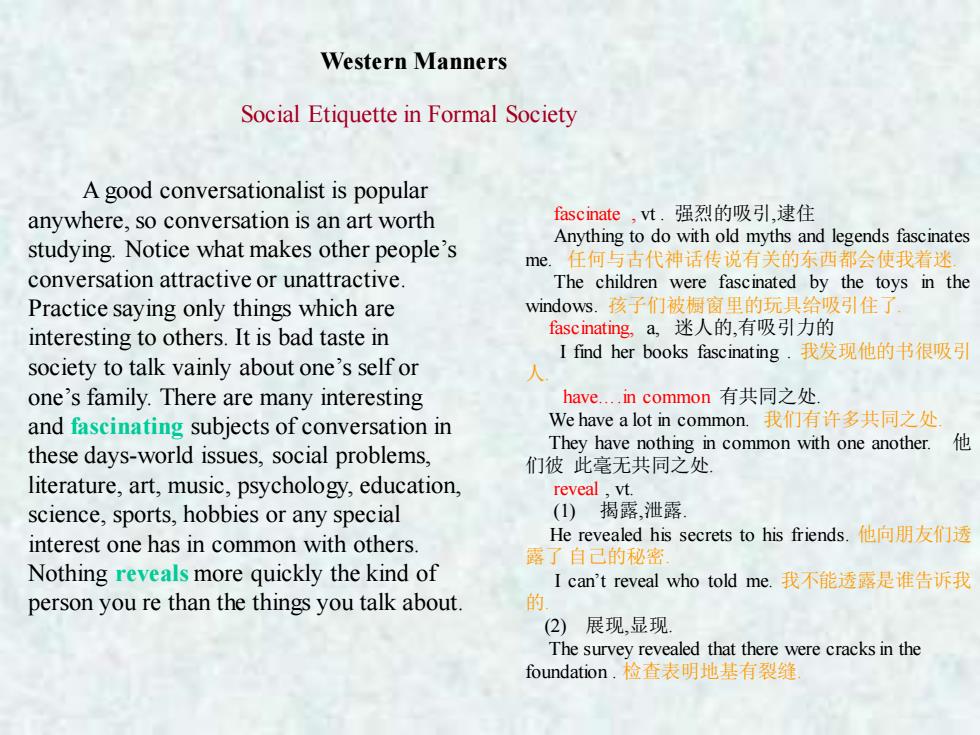
Western Manners Social Etiquette in Formal Society A good conversationalist is popular anywhere,so conversation is an art worth fascinate,t.强烈的吸引,逮住 studying.Notice what makes other people's Anything to do with old myths and legends fascinates e.任何与古代神话传说有关的东西都会使我着述 conversation attractive or unattractive. The children were fascinated by the toys in the Practice saying only things which are windows. 孩子们被橱窗里的玩具给吸引住了 interesting to others.It is bad taste in fascinating,a,迷人的,有吸引力的 I find her books fascinating.我发现他的书很吸引 society to talk vainly about one's self or one's family.There are many interesting have..in common有共同之处 and fascinating subjects of conversation in We have a lot in common.我们有许多共同之处 They have nothing in common with one another. 他 these days-world issues,social problems, 们彼此毫无共同之处 literature,art,music,psychology,education, reveal,vt. science,sports,hobbies or any special (①)揭露,泄露 interest one has in common with others. He revealed his secrets to his friends.他向朋友们透 露了自己的秘密 Nothing reveals more quickly the kind of Ican't reveal who told me.我不能透露是谁告诉我 person you re than the things you talk about 的 (2)展现,显现 The survey revealed that there were cracks in the foundation.检查表明地基有裂缝
Western Manners Social Etiquette in Formal Society A good conversationalist is popular anywhere, so conversation is an art worth studying. Notice what makes other people’s conversation attractive or unattractive. Practice saying only things which are interesting to others. It is bad taste in society to talk vainly about one’s self or one’s family. There are many interesting and fascinating subjects of conversation in these days-world issues, social problems, literature, art, music, psychology, education, science, sports, hobbies or any special interest one has in common with others. Nothing reveals more quickly the kind of person you re than the things you talk about. fascinate , vt . 强烈的吸引,逮住 Anything to do with old myths and legends fascinates me. 任何与古代神话传说有关的东西都会使我着迷. The children were fascinated by the toys in the windows. 孩子们被橱窗里的玩具给吸引住了. fascinating, a, 迷人的,有吸引力的 I find her books fascinating . 我发现他的书很吸引 人. have….in common 有共同之处. We have a lot in common. 我们有许多共同之处. They have nothing in common with one another. 他 们彼 此毫无共同之处. reveal , vt. (1) 揭露,泄露. He revealed his secrets to his friends. 他向朋友们透 露了 自己的秘密. I can’t reveal who told me. 我不能透露是谁告诉我 的. (2) 展现,显现. The survey revealed that there were cracks in the foundation . 检查表明地基有裂缝
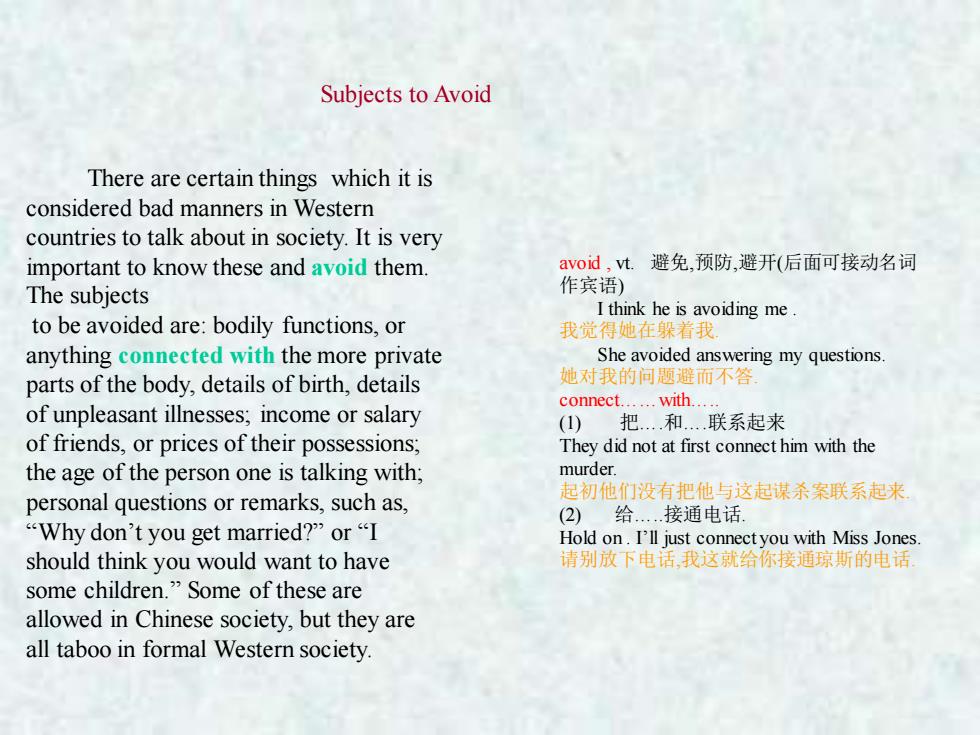
Subjects to Avoid There are certain things which it is considered bad manners in Western countries to talk about in society.It is very important to know these and avoid them. avoid,t.避免,预防,避开(后面可接动名词 The subjects 作宾语) I think he is avoiding me to be avoided are:bodily functions,or 我觉得她在躲着我 anything connected with the more private She avoided answering my questions. parts of the body,details of birth,details 她对我的问题避而不答 connect......with. of unpleasant illnesses;income or salary (1) 把.和联系起来 of friends,or prices of their possessions; They did not at first connect him with the the age of the person one is talking with; murder. personal questions or remarks,such as, 起初他们没有把他与这起谋杀案联系起来 (2) 给..接通电话 "Why don't you get married?"or"I Hold on.I'll just connect you with Miss Jones. should think you would want to have 请别放下电话,我这就给你接通琼斯的电话 some children."Some of these are allowed in Chinese society,but they are all taboo in formal Western society
Subjects to Avoid There are certain things which it is considered bad manners in Western countries to talk about in society. It is very important to know these and avoid them. The subjects to be avoided are: bodily functions, or anything connected with the more private parts of the body, details of birth, details of unpleasant illnesses; income or salary of friends, or prices of their possessions; the age of the person one is talking with; personal questions or remarks, such as, “Why don’t you get married?” or “I should think you would want to have some children.” Some of these are allowed in Chinese society, but they are all taboo in formal Western society. avoid , vt. 避免,预防,避开(后面可接动名词 作宾语) I think he is avoiding me . 我觉得她在躲着我. She avoided answering my questions. 她对我的问题避而不答. connect……with….. (1) 把….和….联系起来 They did not at first connect him with the murder. 起初他们没有把他与这起谋杀案联系起来. (2) 给…..接通电话. Hold on . I’ll just connect you with Miss Jones. 请别放下电话,我这就给你接通琼斯的电话

Speaking about One's Country It is not good manners to speak of one's own country as if it were more sf:引导让步状语从句,表达”好象,仿佛”的 important or betterthan others.But neither is 含 it good to speak badly of one's country or 义,从句一般用虚拟语气形式对现在的虚拟用一 般过去时态,对过去的虚拟用过去完成时 call it“unworthy”. She always talks to me as if she were my sister. Western manners do not require one 她总是以我妹妹的口气跟我说话 to say anything that is untrue,but it is best He behaved as if nothing had happened. to avoid being too frank about things which 他装作若无其事的样了 require,t.需要,要求 would make people feel uneasy-unless by They require extra help.他们需要额外的帮助 doing so you feel some good might cone of All passengers are required to show their passports. it.Speak naturally but not boastfully of the 所有旅客都得出示护照 good things inyour own country,and speak The judge required that the witness should testify. 法官要求证人出庭作证 appreciatively of what you can approve of approve of,赞成,同意,称许 in the foreign country. I don't approve of my son's girl friend 我不赞成我的儿子交那个女朋友 I approve of your trying to earn some money,but please do not neglect your studies.我同意你去挣 些钱,可是请不要误了功课
Speaking about One’s Country It is not good manners to speak of one’s own country as if it were more important or betterthan others. But neither is it good to speak badly of one’s country or call it “unworthy”. Western manners do not require one to say anything that is untrue, but it is best to avoid being too frank about things which would make people feel uneasy-unless by doing so you feel some good might cone of it. Speak naturally but not boastfully of the good things inyour own country, and speak appreciatively of what you can approve of in the foreign country. as if : 引导让步状语从句,表达”好象,仿佛”的 含 义,从句一般用虚拟语气形式.对现在的虚拟用一 般过去时态,对过去的虚拟用过去完成时 She always talks to me as if she were my sister. 她总是以我妹妹的口气跟我说话. He behaved as if nothing had happened. 他装作若无其事的样子. require , vt. 需要,要求, They require extra help. 他们需要额外的帮助. All passengers are required to show their passports. 所有旅客都得出示护照. The judge required that the witness should testify. 法官要求证人出庭作证. approve of , 赞成,同意,称许 I don’t approve of my son’s girl friend . 我不赞成我的儿子交那个女朋友. I approve of your trying to earn some money ,but please do not neglect your studies. 我同意你去挣 一些钱,可是请不要误了功课